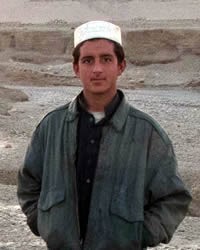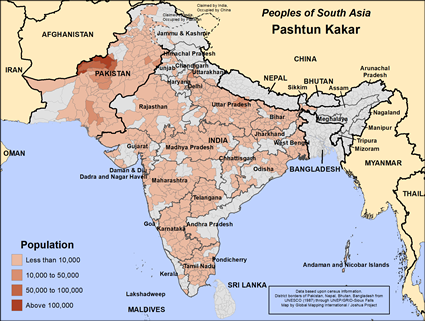The Pashtun have been called the largest Muslim tribal society in the world. There are at least 30 major tribes, and countless sub-tribes and clans. Pashtuns share a unique sense of common identity based on four elements: Heritage, Islam, the Pashtunwali Code of Honor, and to some extent, language (Pakhtu or Pashto). More significant than dialectical differences, a Pashtun's primary loyalty is to his particular social group (tribe or sub-tribe).
There have been efforts to reach the Pashtun since 1818, when William Carey translated parts of the Old Testament into Pakhtu, based on interaction with Pashtun traders who caravanned (and settled) across north India and beyond. The first intentional mission to the Pashtun was launched by the Church Missionary Society in Peshawar, Pakistan in 1853. This was followed by over 150 years of faithful witness. Despite this record, a vibrant, indigenous, disciple-making movement has yet to take root and spread.
Pashto, the language of the Pashtuns, is a complex language. There are many varieties of the one language Pashto. Even women, who have less interaction with outsiders and other language groups, are said to speak a distinctive variety of Pashto.
The majority of Pashtun live in Pakistan and Afghanistan. There is also a large Pashtun diaspora in India, and Pashtuns are the fourth largest Muslim people group in that country. Through the long process of indigenization, most Pashtuns in India today are often indistinguishable from other Indian Muslim communities. They are divided into at least 32 subgroups which reflect various clans, etc. You can find the Pashtuns in most states of India especially Bihar, Madhya Pradesh, Uttar Pradesh and Punjab. Many of the Pashtun settlements in India date back hundreds of years. That includes the Kakar Pashtun tribe that lives scattered throughout India.
Kakar Pashtuns in India have a low literacy rate, which holds them back economically and socially. Those who have a good education often work as professionals or with government agencies, especially police departments. Those in rural areas sometimes earn a good income by renting out family-owned farmland or selling horses. The rural poor among them suffer from unsanitary conditions caused mainly by poor water.
Kakar Pashtuns in India as well as other parts of South Asia have an affinity for Bollywood actors and actresses with the surname of Khan, which they attribute to their own ethnic group. Some Khans are Pashtun, but not all of them.
Honor (and conversely, shame) refers not to personal feelings or a psychological state, but to one's public reputation in the eyes of others. In a collectivistic society like the Pashtun, where community is emphasized over individualism, a person's identity is defined by his/her group. Everything one does is a matter of honor. Where you sit at a meal, who you marry, where you work, how you make decisions or spend money, all are affected by social expectations, and in turn affect one's reputation (honor). Although the practice of Pashtunwali may be decreasing among urban Pashtuns, it remains a unifying theme.
Women are both the weakest link, and most important symbol, of the honor of any Pashtun man, family and tribe. For a woman, honor is equated with modesty. The notion of modesty involves far more than dress and includes the total demeanor of a woman and her submission to the men (father, husband brothers) in her family.
Kakar Pashtuns are Sunni Muslims. Right religious practice (orthopraxy) tends to be more important than right belief (orthodoxy). Actual religious practice and piety vary according to context. As in other parts of the Muslim world, some Pashtuns are cultural Muslims; others are secular, or non-practicing; still others identify with the mystical tradition of Islam.
Pashtuns fear the influence of demons and evil spirits and seek protection by visiting the shrines of Muslim saints through amulets and charms, astrology and fortune telling. Driven by felt needs—healing, desire for a son, relief from an abusive spouse—women especially turn to folk practices to ward off evil and seek God's favor.
Kakar Pashtuns in India need to be liberated from the spirit world. They need a higher literacy rate so they can thrive in India's rapidly developing urban economy.
Pray for each subgroup of Pashtuns in India to have a movement to Christ which will bless them economically and spiritually.
Ask God's Spirit to soften hearts to the truth of the gospel, to confirm the word with signs following, and to reveal Christ to the minds and hearts of Kakar Pashtuns.
Ask God to anoint, and grant wisdom, favor and fruitfulness to workers and agencies focused on the Pashtun.
Kakar Pashtun women are troubled by fears and have deep needs. Ask God to touch their hearts, especially through radio and television, and to help them put their faith in the almighty savior.
Scripture Prayers for the Pashtun Kakar in India.
https://www.encyclopedia.com/social-sciences-and-law/anthropology-and-archaeology/people/pathans
https://www.facebook.com/PathanInIndia/posts/notable-indians-of-pashtun-ancestrybollywood-superstar-shahrukh-khan-is-a-non-pa/146777108809235/
https
| Profile Source: Joshua Project |











